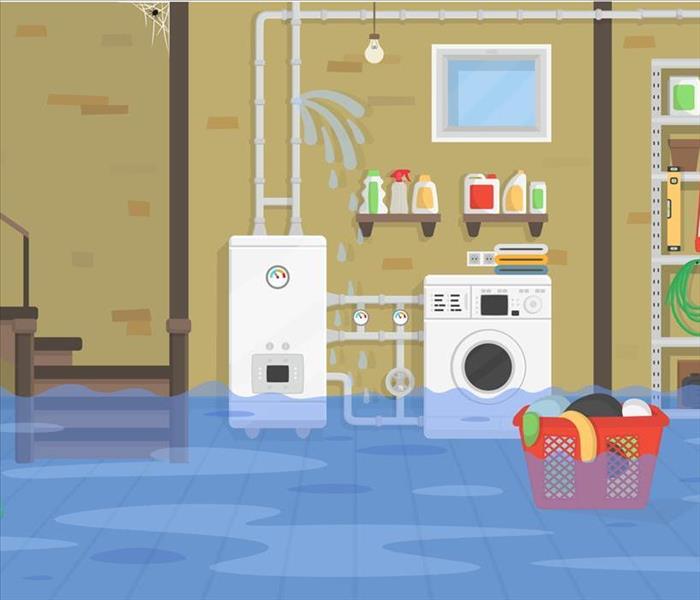Common Causes of Basement Floods
2/23/2022 (Permalink)
 Follow these Tips to learn about Basement Floods and avoid Storm Damage in your Clearfield, UT property.
Follow these Tips to learn about Basement Floods and avoid Storm Damage in your Clearfield, UT property.
A storm in Clearfield, UT, can cause a lot of damage to your roof and other parts of your home. It may lead to a flooded basement, especially if there is a lot of precipitation involved. There are many ways floodwater can invade your home, and knowing the signs of potential issues may help you avoid this problem.
Surface Water Leaks
Water that pools on the ground can enter your home through even the smallest flaw in your foundation. There are many possible sources of surface water during a storm:
- Clogged gutters or downspouts
- Improperly positioned downspout
- Landscape sloping toward your home rather than away from it
- Broken pavement sealant
- Close-range irrigation system
If any of these issues exist near your home, it doesn't take a lot of water to cause a serious problem in your basement. Your first line of defense is doing everything in your power to direct the flow of water away from your home.
Groundwater Seepage
Light rainfall is typically absorbed into the soil or evaporates quickly enough that it doesn't pose much of a threat to the structure of your home. The saturated ground around your house during a heavy storm can lead to a flooded basement, though.
Fissures in the foundation give groundwater a chance to seep into places it's not supposed to go. If you notice water coming in from the floor of the basement or through several different spots, this is likely the cause.
Sewer Backup
Modern homes have a failsafe to keep flooded municipal sewers from backing up into your home. If your house was built before 1980, however, you may experience a sewage problem in your basement if a storm floods the city sewer. This is particularly common in areas of high development due to the probability that the limits of the system are already being overtaxed.
Sewage backup typically enters through sinks or toilets, but it can emerge through any pipe that does not have a valve to block it.
Flood Cleanup
Whether your basement is flooded due to sewer backup or leaks from the surface or groundwater, storm damage remediation specialists can help with cleanup. The sooner you call, the sooner they can arrive and start mitigation. They start by assessing the problem. Then they can give you an estimate of how much the repairs are likely to cost and how much time they should take.
If you have a sump pump in your basement, it can work to remove most of the flood before the team arrives. Otherwise, the mitigation process begins with pumping out excess water. After ruined flooring and drywall are removed, the area is cleaned and dried to prevent further damage. Then the team rebuilds the structure and restores the space.
While preventative maintenance may help you protect your home from a light storm, heavy rainfall poses a more significant risk. Many different issues can cause a flooded basement, and some are more preventable than others. If your home has water damage after a storm, it's smart to call a reliable mitigation team to help with repairs.




 24/7 Emergency Service
24/7 Emergency Service